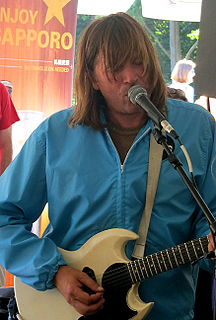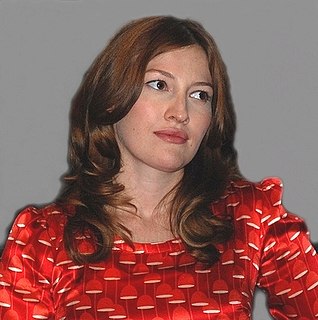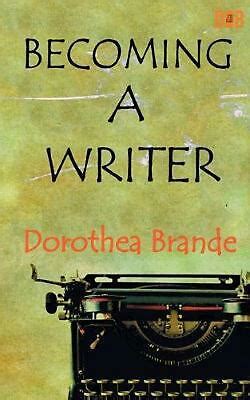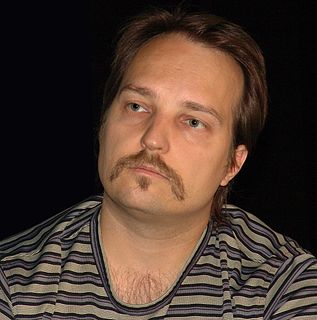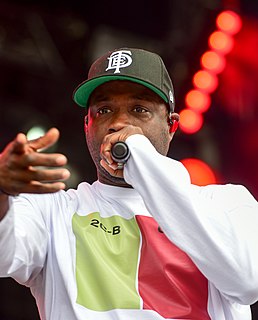A Quote by John Edgar Wideman
I really love James Joyce, Dubliners and other work. And I was interested in the way the dash was used in English topography - in his work particularly - and I realized there was no compulsion to use those ugly dot-dot curlicues all over the place to designate dialogue. I began to look around, and found writers who could make transitions quite clear by the language itself. I'm a bit of a maverick now. I'm always trying to push the medium.
Quote Topics
Related Quotes
A friend came to visit James Joyce one day and found the great man sprawled across his writing desk in a posture of utter despair. James, what’s wrong?' the friend asked. 'Is it the work?' Joyce indicated assent without even raising his head to look at his friend. Of course it was the work; isn’t it always? How many words did you get today?' the friend pursued. Joyce (still in despair, still sprawled facedown on his desk): 'Seven.' Seven? But James… that’s good, at least for you.' Yes,' Joyce said, finally looking up. 'I suppose it is… but I don’t know what order they go in!
If it’s a pure expression of yourself no matter what it is or what medium, it’s going to shine. It’s going to resonate. You could look inside of yourself and you could have a canvas and you could paint a dot in it, but if that is where your creative purpose is taking you then it needs to be that dot.
Joyce's writing in Dubliners contains some of the most unshowily beautiful sentences in the English language. I learned from him that if you write a good, clean line of English, you can get under a reader's skin. The reader won't even know why, but there you are. Didion, Berger, the many others I mentioned above, and many, many poets I haven't mentioned. Writers of this calibre are the moving targets the rest of us are always chasing.
Being a slow reader would normally be a deficiency; I found a way to make it an asset. I began to sound words and see all those qualities - in a way it made words more precious to me. Since so much of what happens in the world between human beings has to do with the inconsideration of language, with the imprecision of language, with language leaving our mouths unmediated, one thing which was sensuous and visceral led to, in the use of language, a moral gesture. It was about trying to use language to both exemplify and articulate what good is.
James Joyce's English was based on the rhythm of the Irish language. He wrote things that shocked English language speakers but he was thinking in Gaelic. I've sung songs that if they were in English, would have been banned too. The psyche of the Irish language is completely different to the English-speaking world.
I think that is one of the first things that I got clear in my mind when I began to play around with fiction, that I had to find a language and it was not in existance at the time. You have put it very well - it wasn't to be taken for granted. You had to go on and search until you found a way through the conversation of English and Igbo. The two languages stuck into each other and tried to find a way to express through one, the medium of the thoughts. That's a very exciting thing to do, a very difficult thing to do.
The censors have always had a field day with James Joyce, specifically with 'Ulysses,' but also with his other writings. The conventional wisdom is that this is because of sexually explicit passages (and there certainly are those). I have always thought that what the critics hated and feared about Joyce is his cry for human freedom.
Because it's kind of great, being an idea that everybody likes. But I could never be the idea to myself, not all the way. And Agloe is a place where a paper creation became real. A dot on the map became a real place, more real than the people who created the dot could never have imagined. I thought maybe the paper cutout of a girl could start becoming real here also. And it seemed like a way to tell that paper girl who cared about popularity and clothes and everything else: 'You are going to the paper towns. And you are never coming back.
The problem with natural language processing and the thing that really holds the technology back, is that when it crashes and burns, it's horrific. I think we would be in a position to really take a serious look at it, once two things happen. The interesting thing about a dialogue-choice system is that we've devoted so much into all kinds of other systems for processing, and dialogue choices use zero processing. So suddenly, if you want to have a great natural language processor, you need to dial down your graphics to make it work.





